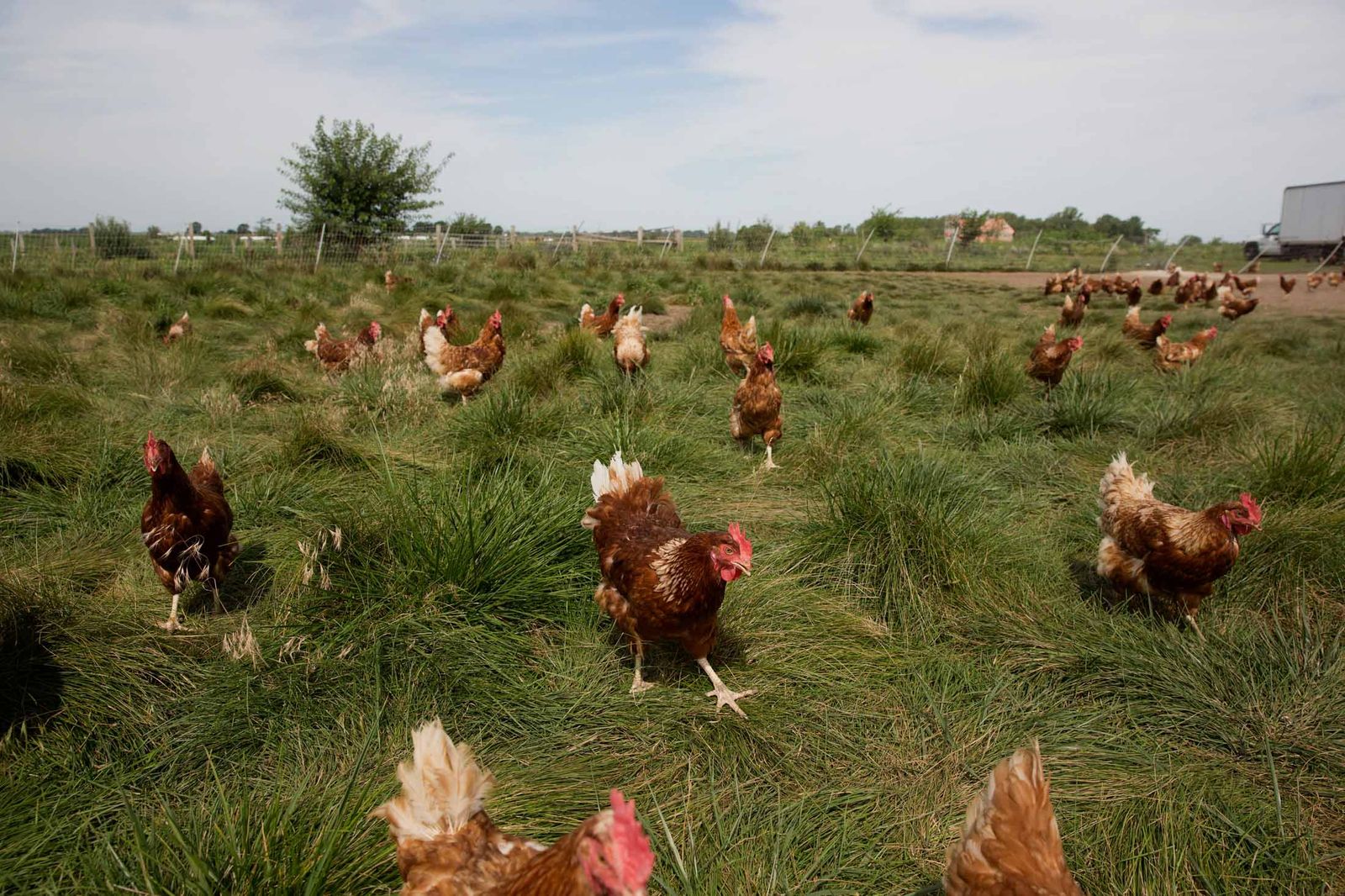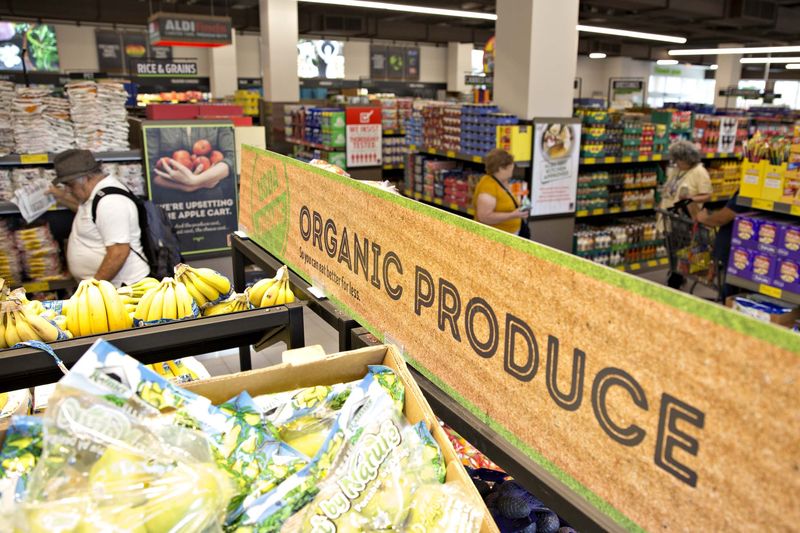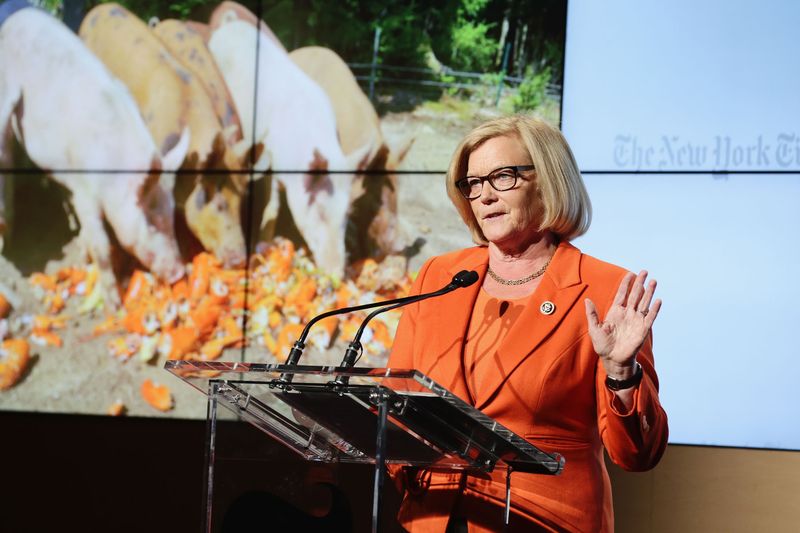Bloomberg: Trump’s USDA Is Killing Rules That Organic Food Makers Want

Lohmann Brown chickens walk around outside a barn at Meadow Haven Farm, a certified organic family-run farm, in Sheffield, Illinois.
Photographer: Daniel Acker/Bloomberg
by Andrew Martin and Shruti Singh | July 11, 2018
The organic industry has sought out government oversight to reassure consumers. Now some worry that deregulation could chip away at that confidence.
Regulation isn’t a dirty word to makers of organic food.
So they’re pushing back against the Trump administration, which has killed off a slate of proposed regulatory changes for raising and manufacturing organic products after coming to power promising to remove “job-killing regulations.” In recent months, shelved proposals have included those covering animal welfare, the manufacture of pet food and beekeeping.
Stringent regulations are crucial to maintaining consumer confidence in the organic label that the U.S. Department of Agriculture oversees, according to many producers. They also help manufacturers command premium prices. Even some traditional food giants, including Perdue Farms and General Mills, have made the case for certain new regulations.
The egg business—already rife with consumer confusion over marketing claims such as “pasture-raised” and “cage-free”—may feel a particular impact from the administration’s actions.
Organic regulations are fuzzy on what constitutes outdoor access for hens, and they’re applied inconsistently, the Organic Trade Association says. Cal-Maine Foods Inc. and Herbruck’s Poultry Ranch, among other big producers, have complied with outdoor-access requirements by providing screened “porches” on large-scale hen houses, company statements and filings show. The animal-welfare rule that the USDA abandoned in March would have tightened the outdoor standards and required hens to have access to the outdoors, including soil.
The nixed rule could pave the way for more large-scale organic hen houses that could force small farmers out of business, said Jesse Laflamme, chief executive officer of Pete and Gerry’s Organics, an egg producer in Monroe, N.H.
Laflamme accused the Trump administration of “waging war” on his industry. “For whatever reason, they think it’s in their constituents’ interest to diminish the organic program as much as possible,” he said.

Eggs from Lohmann Brown chickens pass over an inspection light inside a barn at Meadow Haven Farm.
Photographer: Daniel Acker/Bloomberg
Deregulation doesn’t make sense for an industry that wants it, said Laura Batcha, executive director of the Organic Trade Association. She warns of “collateral damage” to an industry that has experienced robust growth.
Over the last five years, the organic-food business has grown 10 percent annually, on average, and now accounts for 5.5 percent of food sold in the U.S., the group said. Strong regulations give the organic label strength and differentiates it from other marketing terms, such as “natural,” Batcha said.
“To stick to the tactics you use even when it gives you the opposite outcome doesn’t make any sense,” she added.
Cal-Maine Foods didn’t respond to a request for comment.
Greg Herbruck, president of Herbruck’s Poultry Ranch, said the company set up screened porches to protect its hens from dangerous diseases and deadly predators. He said the abandoned animal-welfare rule was “deeply flawed” and wouldn’t have protected livestock.
For many industries, including segments of agriculture, fewer regulations are a cause for celebration. By contrast, the organic industry sought out government oversight in the late 1980s and has continued to press for updates to the regulations (though there is sometimes opposition to individual proposals).
Representative Chellie Pingree, a Maine Democrat who’s an organic farmer herself, said the administration’s long-term policy for organic isn’t clear.
The last thing you want is “for consumers to have a hint of uncertainty about what they are paying for,” she said. “That’s got to be sacred.”
The Agriculture Department provided a written statement in response to questions from Bloomberg News. “USDA strongly supports the public-private partnership that has made organic agriculture the success that it is today,” the statement said.
The agency has made enforcement a priority and is advancing a new rule to increase oversight and enforcement of organic products, it said. It has also bolstered scrutiny of organic imports, stopping three recent suspect shipments that included chickpeas and 39,000 metric tons of corn, according to the agency.
Agriculture Secretary Sonny Perdue has pushed for deregulation in other parts of his agency and the federal government, reversing an Obama-era decree giving poultry producers more power to sue big processors and easing up on nutrition requirements for school lunches that former first lady Michelle Obama championed.
Questioned by Bloomberg News at a Chicago conference on June 26, Perdue suggested that the animal-welfare proposal was a defensive reaction by small organic producers as bigger operations “figured out how they could comply with organic standards.” Besides, he said, the organic proposals went beyond his agency’s mandate to ensure food safety and provide certification.

Sonny Perdue, former governor of Georgia, arrives at Trump Tower, Nov. 30, 2016, in New York City.
Photographer: Drew Angerer/Getty Images North America
“Organic purity is one thing, but telling people how they can reach that I think overreached the ability of what the organic standards should be,” said Perdue, a former Georgia governor who isn’t affiliated with the poultry company of the same name.
The Organic Foods Production Act of 1990 was passed after the industry sought federal standards to settle conflicting definitions for organic. It took effect in 2002. The organic industry is regulated by an arm of the Agriculture Department called the National Organic Program. A 15-member advisory board makes recommendations about issues that arise, including defining organic honey and determining whether certain nonorganic ingredients can be used in processed foods.
Major changes to the organic regulations are approved infrequently, and the process can drag on for years. Nonetheless, both the Bush and Obama administrations passed significant new ones. They also usually approved recommendations from the advisory board or allowed them to languish in bureaucratic limbo, industry advocates said. The Trump administration, by contrast, has withdrawn recommendations altogether, they said.
“This administration has a very narrow focus,” said Harriet Behar, a member of the advisory board. “We do hear, ‘Oh, that’s not our priority, so we won’t be talking about that.’”
In March the Agriculture Department withdrew the rule on the treatment of organic livestock and poultry. It had sought to stiffen the outdoor-access requirements so organic hens spent time on soil—rather than on enclosed porches with concrete floors, the agency said.
Out of about 72,000 comments the Agriculture Department received on a proposal to withdraw the livestock rule, at least 63,000 opposed the idea, according to the agency. The Trump administration pulled them anyway, saying they exceeded the Agriculture Department’s regulatory authority.
In April the Agriculture Department rejected a recommendation to remove a seaweed derivative called carrageenan from a list of nonorganic ingredients allowed in organic foods. The department’s organic advisory board had concluded that other, more acceptable ingredients were available to replace carrageenan.
The next month, the agency pulled support for a proposed organic promotion and research program that the Organic Trade Association was pushing, citing a lack of consensus. It would’ve been financed by an assessment on certified organic producers and businesses; similar programs are already in place for commodities such as pork, dairy, and mangoes.
And in June, the administration published a list of other proposed changes to organic regulations that had been pulled in previous months, including tightened rules for replacing organic dairy cows and new standards for manufacturing organic pet food, the latter of which had been sought by the industry for more than a decade.
All of the organic rules “now labeled as inactive were initiated before January 2017,” when the new administration took office, the Agriculture Department told Bloomberg News. The dairy rule would have constrained options for farmers transitioning to organic, and the organic pet food standards aren’t necessary because the industry is growing without those rules, the agency said.
Not all the proposed changes to the regulations were universally loved. Some manufacturers objected to removing carrageenan from the list, and some farmers opposed the research and promotion plan. Opponents of the animal-welfare rule included powerful U.S. senators and farm trade groups.
Dan Kovich, director of science and technology at the National Pork Producers Council, called the animal-welfare rule “flawed,” adding, “There are real economic consequences to that approach that not all producers are going to be able to weather,” he said.

An “Organic Produce” sign is displayed in the produce department at an Aldi Stores Ltd. food market in Chicago.
Photographer: Daniel Acker/Bloomberg
Several longtime participants in the organic industry say the Trump administration is accelerating a process that was already under way, as big corporations have sought to co-opt the marketing power but not the spirit of organic. Mark Kastel, co-founder of the Cornucopia Institute, an advocacy group that investigates abuses within the organic industry, said the problem isn’t so much the size of an operation as the intent of its owners.
“These aren’t matters of corporate scale,” he said. “They are matters of corporate ethics.”
Some organic farmers have become so frustrated by the direction of the government’s organic program that they have come up with their own enhanced standards, called the Real Organic Project. They eventually plan to add a label to packages, in addition to the USDA’s organic seal.
“We’re not trying to undermine the National Organic Program,” said Dave Chapman, a Vermont farmer and executive director of the Real Organic Project. “We are trying to save it.”
Asked about concerns among small organic producers that Big Ag is taking over, Perdue, the agriculture secretary, chuckled. “If you believe in socialism, you probably ought to export your operation somewhere,” he said.
